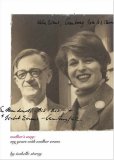
See larger photo
| Walker Evans
     
[Click on the appropriate flag to buy the book] | Product Details
Hardcover
600 pages
Basic Books
Published 1999
Amazon.com
Before his death in 1997, James Mellow left one last gracefully written, sensitively nuanced biography to add to a shelf containing National Book Award winner Nathaniel Hawthorne in His Times and a remarkable trilogy on seminal figures of the Lost Generation. Mellow's biography of photographer Walker Evans (1903-1977) is just as nimble in making connections between an individual life and the cultural trends it reflected and affected. Although he will always be best remembered for the austere images of Depression-era poverty that accompanied James Agee's prose in Let Us Now Praise Famous Men, Evans was a nondidactic social realist. "I love to find American vernacular," he once remarked, and Mellow's subtle analysis of Evans's work shows his fastidiously uninflected photographic style being mistaken for a "documentary." In fact, the images' psychological intensity and formal sophistication make the photographs far more than simple records of a time or place. Mellow does not neglect Evans's turbulent personal life, including two divorces and a drinking problem, and is astute about the role in his success of collaborators like Agee, "more ambitious, more hard-headed, more informed about opportunities and better placed to make use of them." Each page and elegantly turned sentence proclaims Mellow's mastery of the biographical craft; he will be sorely missed. --Wendy Smith
From Publishers Weekly
When NBA-winning biographer James R. Mellow (Charmed Circle: Gertrude Stein & Company) died in 1997, he left behind an unfinished manuscript on the life of American photographer Walker Evans. That manuscript makes up the bulk of this book, and chronicles, in abundant detail, the first 53 years of Evanss life: 16 pages of Mellows notes conclude the volume by outlining Evanss activities from 1955 to 1977. This dense, well-documented study should satisfy anyone seeking a comprehensive account of... read more
Book Description
The definitive biography of Walker Evans (1903-1975), one of the great American photographers of the twentieth century, is full of rare photographs and written by one of America's most esteemed biographers
The Depression Era photographs of Alabama sharecroppers by Walker Evans remain among the most indelible and iconic images in the American consciousness. Indeed, the entire oeuvre of this great photographer is one of the most influential bodies of photographic work in this century.
As James R. Mellow's landmark biography makes clear, however, Walker Evans was not the propagandist for social causes he was presumed to be. He was, instead, a fastidious observer of the true nature of things or, as he himself has said, of "things as they are." His instinctive aversion to artifice set him apart from the formalism of his photographic predecessor, Alfred Stieglitz, as well as from his immediate contemporary, Ansel Adams. Evans's commitment, rather, lay in documenting the dusty particulars of American life, the back roads, the run-down mill towns, the roadside stands, and torn movie posters. He developed a distinctive vernacular that made his photographs immediately recognizable, and influenced countless other photographers, including Robert Frank and Dorothea Lange.
With unrestricted access to all of Evans's diaries, letters, work logs and contact sheets, as well as the diaries of Lincoln Kirstein, Mellow has produced not just a definitive biography of a major American artist but a fascinating cultural history of the period. |
Manuel Alvarez Bravo, Henri Cartier-Bresson, and Walker Evans.
Documentary and Anti-Graphic Photographs: A Reconstruction of the 1935 Exhibition at the Julien Levy Gallery in New York.
Alvarez Bravo (Photographer); Henri Cartier-Bresson (Photographer); Walker Evans (Photographer); Daniel Giradin (Essay); & Ian Jeffrey (Essay) |  |
|
Many Are Called
Walker Evans (Photographer) |  |
|
Walker Evans: Signs
Walker Evans (Photographer); Andrei Codrescu; & J. Paul Getty Museum |  |
|
Walker Evans: Cuba
Walker Evans (Photographer); Andrei Codrescu; & Judith Keller (Introduction) |  |
|
Incognito: Limited Edition
Walker Evans (Photographer); & Leslie Katz (Compiler) |  |
|
Walker Evans: Photographs for the Farm Security Administration, 1935-1938: A Catalog of Photographic Prints Available from the Farm Security Admini
Walker Evans (Photographer); & Library of Congress |  |
|
Walker Evans: Florida
Walker Evans (Photographer); & Robert Plunket |  |
|
|
Walker Evans: Polaroids
Walker Evans (Photographer); & Jeff L. Rosenheim |  |
|
Documenting America, 1935-1943 (Approaches to American Culture, No 2)
Carl Fleischhauer (Editor); Beverly W. Brannan (Editor); & Lawrence W. Levine (Editor) |  |
|
Walker Evans Simple Secrets: Photographs from the Collection of Marian and Benjamin A. Hill
Ellen Fleurov; Marian Hill; & High Museum Of Art |  |
|
|
|
American Photographers of the Depression: Walker Evans, Dorothea Lange and the FSA Photographers (Photofile)
Charles Hagen |  |
|
Walker Evans: American Photographs
Lincoln Kirstein; & Walker Evans (Photographer) |  |
|
Perfect Documents: Walker Evans and African Art, 1935
Virginia Lee-Webb; & Virginia-Lee Webb |  |
|
|
Walker Evans (Photofile)
Gilles Mora (Introduction); & Walker Evans (Photographer) |  |
|
|
Walker Evans: A Biography
Belinda Rathbone |  |
|
|
|
|
Walker Evans (Phaidon 55 S.)
Luc Sante; & Walker Evans |  |
|
Walker’s Way: My Years with Walker Evans
Isabelle Storey (Author) |  |
|
The Last Years of Walker Evans: A First-Hand Account
Jerry L. Thompson; & Walker Evans |  |
|
Reading American Photographs: Images As History: Mathew Brady to Walker Evans
Alan Trachtenberg |  |
| |

